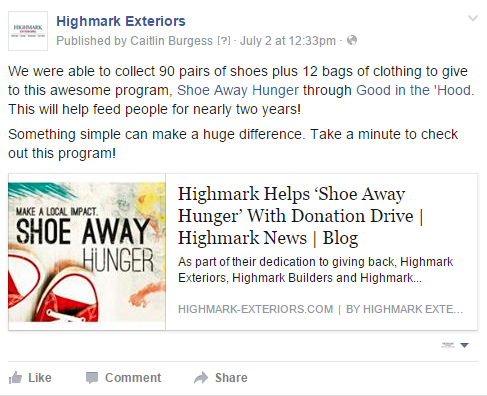
Subscribe to our newsletter!
We don't spam. You will only receive relevant and important tips for you and your business.
Unsubscribe anytime.
By Ryan Boog
When it comes to maintaining a successful digital marketing campaign for your business, any experienced digital marketer will tell you that link earning is one of the most crucial components of success.
Link earning is the offspring of link building. Link building was the process of earning links to your site by any means necessary. Link earning still aims to secure links, but the tactics to get those links are more refined and have more emphasis on quality versus quantity.

Hoist has worked on a number of different digital marketing campaigns in the last ten+ years, and below we’ve put together some of our best practices for finding quality links--along with some examples of how it’s worked for our clients.
Set up a tracking system that will allow you to record all your initiatives. One of our favorites is Google Sheets. Google Sheets allows you to create Excel-like documents with multiple tabs--which is perfect for organization.
![]()
This is low hanging fruit that takes almost no effort to get after. You likely have pretty solid relationships with your business partners and vendors, so asking them for a link is easy and has a pretty high success rate.
Just a simple web search of your business name can turn up a number of different opportunities. On Google, you can take advantage of the different categories and find any general web mentions, news stories, existing directory listings or images that feature your business name.
For example, a search may turn up an old news article mentioning your business, but there is no link to your website. You can politely reach out to the publication and ask for a link. Easy peasy.
Now, use some common sense here. Search results aren’t perfect, so don’t get discouraged if you’re finding some pretty random stuff or other similarly-named businesses. Refine your search a couple of times to include additional words to get a full picture of what’s out there.
Make a list of your top three to five competitors and start digging. Take a look at their websites to get an idea of what keywords they’re attempting to rank for, look at the content they’re producing, look at their social pages, do a Web search to see where they’re being talked about and where they’re getting their links, and take a look at what kind of reviews they have around the Web. Any information you can get about how your competitors are succeeding or failing can be helpful to your campaign. Of course, record your findings in the spreadsheet you’ve created.
 Directories get mixed reviews, but we believe they can be an important tool in your marketing arsenal. Directories give people another place to find you on the Internet and they do send a little bit of juice to your site when you add your website address. Also, many allow customer reviews, which can also pass a little juice on.
Directories get mixed reviews, but we believe they can be an important tool in your marketing arsenal. Directories give people another place to find you on the Internet and they do send a little bit of juice to your site when you add your website address. Also, many allow customer reviews, which can also pass a little juice on.
Which directories should you be on? There are probably thousands of different directory sites out there and chances are--if it looks spammy it is spammy. So, use your best judgment on this. Some of our favorites are Yelp, SuperPages, Facebook, Houzz, Manta, Angie's List and Home Advisor.
Remember that Web search you did? Did you find any of the existing directory listings? If so, it’s time to check ‘em out and make sure all the information is up-to-date and that info is the same across all the platforms. For obvious reasons you want to make sure that all the information on these listings is the same, but it’s also important for SEO purposes. It’s how the bots can identify you as the same business.
We recently started working with HomeSmart from Xcel Energy, a provider of appliance repair and maintenance plans, and a division of Xcel Energy. We found that many of the directories pointed to Xcel Energy’s website, not HomeSmart’s. We claimed profiles where we could and made updates ourselves, and also submitted changes directly to the website. They were listed on a total of 36 directory websites and we found 11 with wrong or missing website information. Needless to say, this is an excellent way to get info cleaned up and get some links, too.
This is something that you will hear over and over again: Content is king. And it’s true. Your website content is what keeps people on the page. And it can also be an opportunity to draw people to your website. If you don’t have a blog or tips section, get one. If you have one but you’re not updating in regularly, make time for it.
While some cities are not willing to endorse any businesses with a link, this one is definitely worth a try. Reach out and see if your local municipality has a business directory.
For example, our client, Precision Landscape & Tree, is a tree care company that is licensed to work in a number of cities around the Twin Cities metro. We looked at all these cities’ websites and found that many of them offer residents a list of tree care providers. We also found that many of them have forestry pages with links to resources.
We reached out to all of them in hopes of either being added to the existing list of approved providers, getting them to create a list or add a link to our comprehensive guide on emerald ash borer. Many cities obliged; but not all of them. But in those cases, their name was exposed to civic decision makers that may one day become a great customer.
Do you offer discounts to students? Does your alma mater have an alumni page? Websites with the “.edu” designation can pass a lot of good authority onto your site, and if you have a legitimate reason to get a link, pursue it.
Schools are eager to promote success from alumni. If you have a great success story and can tie it to how you used your education to propel you to success, they’d love to share that with their potential incoming students.
Another option is to sponsor an upcoming event or offer a scholarship. This will cost you a little dough, but it’s a way to get a link back to your site while also helping the community.
You already know that you should be on social media to promote your business. But, just having a page isn’t enough. You need to engage with our followers regularly, share a range of content to keep them interested and also utilize other organization’s pages to give yourself a little PR. This is where that shareable content comes into play.
For example, did your company recently participate in a food drive? Write a blog post about it, share the link on your Facebook page and mention the organization you helped out in your message. In addition, go directly to the organization’s page and share the link there, too. This is a way to spread your content around and have it picked up by others.

Tip: Strap a jetpack to your blog post by boosting it with paid ads or promoted posts on social media.
Guest blogging is a great way to network, create great content and get links back to your site. Make sure the website is relevant to your business and that it appears to be a quality experience for users.
Tip: Make an effort to guest blog multiple times for the same website or blog. You will not only get more links back to your site, but you will also work your way into their existing crowd base and build your brand even further.
Right here is where you take action on the things you’ve found in your initial Web search and your competitor research. Did you find that your business was mentioned in an article, but there is no link? Did you find a competitor mentioned in a blog? Craft a quality and personable message to the author or business contact, and just ask them to make the update or tell them why they should consider highlighting your business, too.
This tactic is probably one of the most difficult to get traction on. So, don’t feel bad if you don’t get many responses. Take the time to refine your strategy and do a little research on what makes a successful contact.
Some in the industry call this the “moving man method.” Its premise is simple but effective. You help other websites out by finding their broken links and offering them a new link to replace it with...a link to your website.
Start out by doing some research and find a company in a related industry that just went out of business or shut down their website. Use Google News for good results on that. Once you have a target company, compile a list of backlinks to that site. We have pro memberships at Moz and Ahrefs that allow us to get details on existing backlinks to any site.
Now that you have your list of links to that site, go through and see if any are from a good source. Use your tracker to make a list of your intended targets and reach out to them, one by one. Mention the broken link and suggest an even better replacement.
Follow up with everyone you reach out to--but don’t spam them. I generally like to send out my first email, wait a week or two and then send out my follow-up. Occasionally, I may send a third message, but generally, I think that if you don’t hear back after the second attempt that’s usually a sign. The key here is to avoid automation, people can sniff that out almost all of the time. Personalized emails almost always win.
Link earning is an essential digital marketing strategy for those looking to increase their online presence and get up a little higher in the search results.
Now, this is in no way a complete list of all the tactics you can use for link earning, but these are all relatively simple and effective things to add to your checklist. And, as we said, links are a ranking factor, not the only factor. So link earning should be combined with other digital marketing efforts such as creating and implementing an on-site keyword strategy.
In what ways do you earn links? Let us know